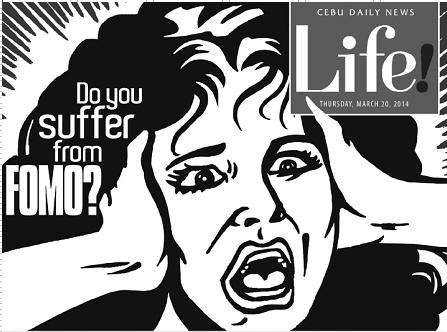THE FEAR OF MISSING OUT. We know the feeling. It’s something many of us have experienced. Most common among the under-30 set, it’s when we start feeling nervous about not taking part in social events, like that party everyone who’s anyone showed up to last weekend. Although we have pretty much always been concerned about our social standing, the immense popularity of social media has made FOMO a bigger deal. And now researchers say they’ve developed a system to test just how fearful we are about missing out.
Let’s Not and Say We Did — The Need-to-Know
How often do you check social media and how worried are you when friends are hanging out without you? FOMO is often associated with a perceived low social rank, which can cause feelings of anxiety and inferiority. When we miss a party, vacation, or any other social event, we sometimes feel a little less cool than those who showed up and snapped photos. In some cases, people are even afraid to miss out on bad stuff! FOMO is most common in people ages 18 to 33—in fact, one survey of people in this age group found two thirds of participants said they experience these fears. The survey also suggests FOMO is more common among guys than ladies, though it’s still unclear why.
Research suggests FOMO can take a pretty strong negative toll on psychological health. Constant fear of missing events can cause anxiety and depression, especially for young people.
In more extreme cases, these social insecurities can even contribute to violence and feelings of shame.
Over the past few years, there’s been a lot of research on the way social media influences FOMO. Recent research suggests people who experience FOMO are most likely to value social media as part of their social development. Status updates and tweets let us know about all the exciting activities happening while we’re home fiddling with the TV remote control. Some psychologists even suggest FOMO helps drive the success of social media platforms, since we feel we need to use the technology to let us know what’s happening elsewhere. But, in some cases, FOMO may actually give us positive motivation to socialize with friends.
Have No Fear — Your Action Plan
Some argue the feelings associated with FOMO strengthen connections with others, encouraging people to be more socially active. While it might be anti-social to sit around Facebook stalking pseudo-strangers, it’s possible to use social media in a more constructive way, like keeping in touch with friends and planning activities.
Well, we can’t necessarily blame anyone’s social media feed for causing FOMO. Fears about missing out may be a type of cognitive distortion separate from technology, causing irrational thoughts associated with depression (like believing all those friends hate us if we didn’t get an invite to a get-together). For people prone to these kinds of thoughts, modern technology may just exacerbate their fears about missing out. So unplugging all those gadgets might not solve the problem as well as cognitive behavioral therapy or another kind of talk therapy.
When scoping out other people’s plans, especially online, remember that many people project their most idealized selves on the web, so spy with a skeptical eye. And to those of us who are confident enough in our own weekend plans … well, hats off.
The Takeaway
FOMO’s a real issue: Most people under 30 admit to worrying that their friends are hanging out or doing something cool without them. There’s nothing wrong with scrolling through that Facebook news feed every morning just to see what everyone’s up to—it’s only a problem if we’re driven crazy by excessive fears about missing out on social events. (greatist.com)
